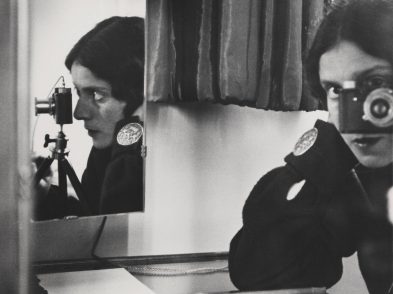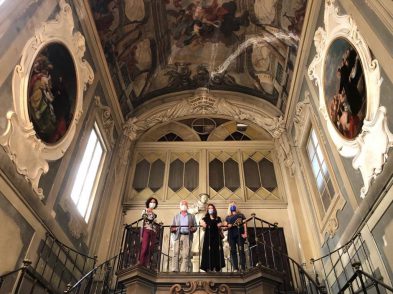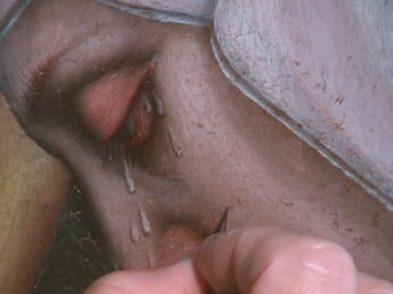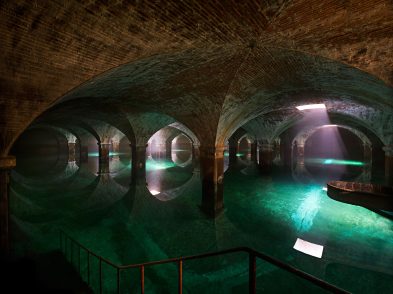The freccia argento to Rome is a quick but expensive rail
line that’s worth its weight in silver, where the borrowed English bloke on the
loudspeaker invites passengers to visit the dining car by announcing
‘Travelling stimulates your appetite.’
Whether or not that claim is true, Filippo and I spent
a day in the capital last Friday, to scope out a historic art gallery in via
del Babuino, where his so-called cousin, to whom he has no real relation, had
set up a wedding registry. The couple preferred guests to collectively purchase
a cakey abstract canvas instead of loading them up with questionable kitchen
gadgets that come without costly counter space. Though we’d been invited to the
ceremony mass, but not the dinner, and don’t know contemporary art from my
niece’s chocolate handprint on the wall, we still liked the gift idea. And
because I am both pro-wedding and pro-silver trains, Filippo was bullied into
braving his way to Rome. The morning’s secret mission was to get him past the
Termini taxi stand without voicing an unfailing Tuscan jibe: l’unico problema di Roma sono i romani.
You won’t be
surprised, I’m sure, to hear that this mission failed miserably. Ordering a
coffee and un cornetto was apparently enough to merit the
comment. Obviously, the rationale behind such prejudice had little to do with
the overexcited coffee server, who dealt plates like poker cards. Si sa: this brand of discrimination dates back to long
before Giovanni de’ Medici became Pope Leo X. Besides that, Filippo was un po’ su di giri, incorrigibly wound up, as we spent
the train ride (well, he spent the train ride) raving about
the woes of Italy. Denouncing the parliamentarian wolf who had supped on granny
this week, he also condemned Prime Minister Monti for his blitzkrieg on
merchants, fining them for not providing their customers with ‘obligatory
booklets’ describing product materials, as outlined in an obscure 2005 law,
that the whole of the country ignored until yesterday.
He finished
the ranting by shaking his thumb and forefinger at me, as if with a key turning
inside the wrong lock. ‘Qui, non c’è trippa per gatti,’ he concluded, and whatever tripe he meant appeared
to be truly missing.
Because I
was more interested in the axiom than the politics, Filippo conceded to
explaining that Rome’s mayor had written this sentence in his ledger at the
start of last century to ban city officials from using public money to purchase
cow guts for the calico cats that lived in Campidoglio. The strays should get
no tripe, the mayor had insisted. They would do better to eat the rats that
ceaselessly nibbled on the city’s oldest archives. ‘He was London-born and a
freemason,’ Filippo added looking strangely victorious. ‘And, in the end, he
succeeded in balancing the budget.’
I frowned.
When still grappling with the idea of rodents snacking on books in the
basement, budget balancing seems a minor achievement. If, on the other hand,
one can get past the rats and wishes to uncover the saying’s meaning, consider
it a proclamation of hopelessness or rejection: ‘Look elsewhere, buddy. We
ain’t got what you’re looking for.’ It means that you can knock all you want or
even bust down the door: you’ll find no tripe or positive prospects in the
whole bad building, punto e basta.
Despite
Filippo’s mood, the city pulled out all the stops. The sunny air was steeped in
springtime, its designer shop windows had the shine of exorbitant new-season
shoes, the Piazza del Popolo accordionist was playing Brazil, Brazil and, inexplicably, after two
decades in Italy, I was overcome with the strange longing to possess an ugly-as-sin
miniature Colosseum, badly made in Chinese resin. Piazza di Spagna was packed
with lounging individuals from every country-all loud and slightly storditi-looking punch-drunk on the
Fellini-like desire to wade in the fountain while shouting ‘Marcello.’ In other
words, the Spanish steps were the top of the world. And then, without warning,
there it was-that ungraspable, taken-aback feeling, that made me search for an
urgent seat, wedged between a young, equally pale Spanish Goth and Japanese
woman. Lo and behold, I was being seized by the ‘Italy feeling.’
There is not
an expat in the bel paese who cannot identify the precise
moment he or she first felt it: that lung-filling sense of elation that’s both
dizzying and grounding; that unforgettable moment when one first realizes or
recognizes that Italy is, well, the place. Your place.
‘What’s
wrong with you?’ Filippo wanted to know, crouching down beside me.
‘Nothing,’ I
said squinting from the sun. ‘È solo che l’Italia è bella.’
‘Si…’ he nodded. ‘È bella.’
‘I know it,
but I don’t always see it.’
In answer,
he simply lifted his hand to my forehead, as a way to give shade.
I agree with
Filippo, ultimately. In this country, in many ways, ‘there is no tripe for
cats.’ Precarious as things are, Italy is pretty much a founding member of the
recently constituted Going-to-Hell-in-a-Hand-basket Club, for rampant reasons
we’ll have to chase another day. But my real question is this: who needs tripe
anyway? And who needs rats, or even ruin-dwelling cats? Just give me Rome, the
lofty capital, on a day when spring is new, and give me that thunderstruck
instant not once, but immeasurably often. Dizzying and grounding, immeasurably
often. The place.







